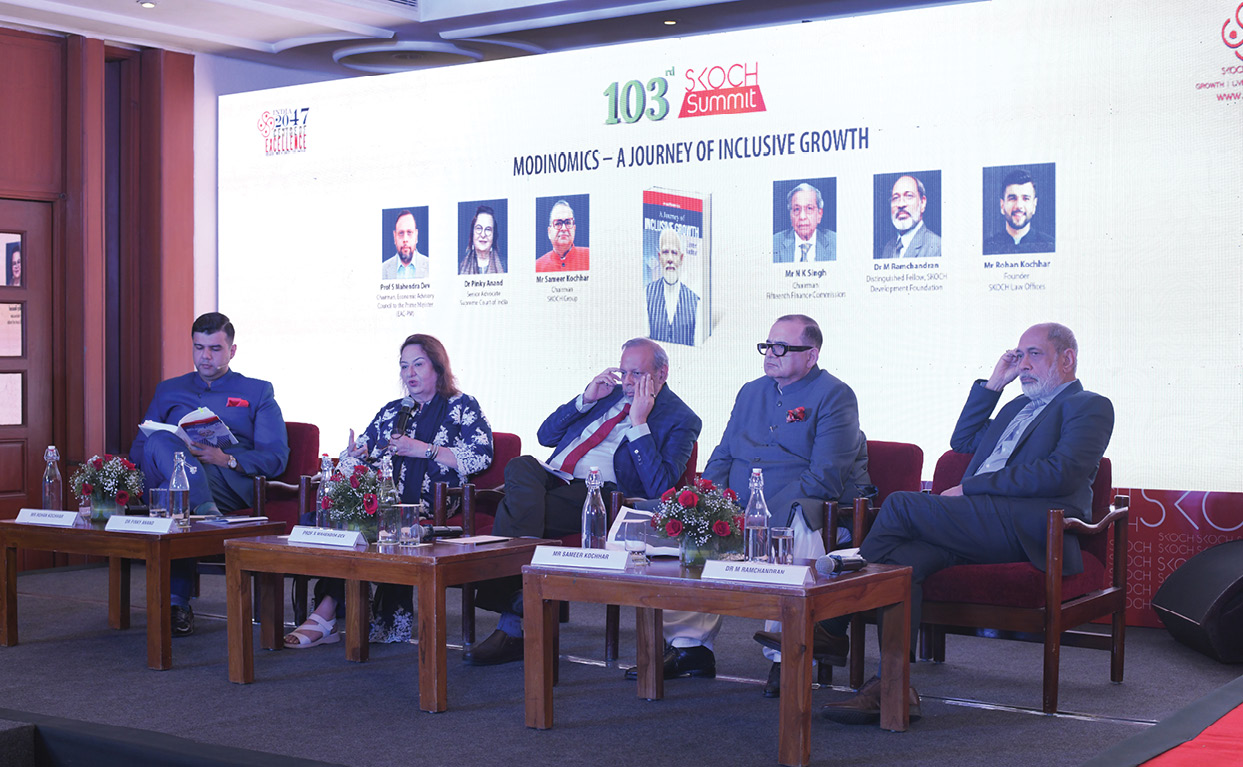Key Points*
- 103rd SKOCH Summit Welcome – Opens the discussion with dignitaries across government, judiciary, academia, and industry.
- Book at the Center – Modinomics: A Journey of Inclusive Growth presents 25 years of Prime Minister Modi’s public service and policy evolution.
- Guiding Ethos – Frames governance around Sabka Saath, Sabka Vikas, Sabka Vishwas.
- Last-Mile Inclusion – Traces impact via Jan Dhan banking, Ujjwala, Swachh Bharat, rural electrification, digital access, housing, and infrastructure—delivered at scale and speed.
- Macro Reforms & Resilience – Reviews GST, IBC, digital payments, and welfare delivery systems that improved transparency and efficiency.
- Core Question of Inclusion – Asks whether growth has been truly inclusive and how the poorest have experienced day-to-day change.
- Evidence + Global Context – Positions India’s arc from scarcity to opportunity, aspiration, and scale.
- Chronicle and Verdict – Measures distance traveled, promises kept, and challenges ahead—marking a quarter-century of leadership.
- Who Should Read – Essential for policymakers, scholars, business leaders, and citizens seeking a grounded view of inclusive, sustainable governance.
- Session Flow – Quote-led discussion from the book, followed by invited reflections—beginning with remarks from author Sameer Kochhar.
* This content is AI generated. It is suggested to read the full transcript for any furthur clarity.
Transcript
Am I audible?
A very warm welcome once again to the Honorable Ministers, Honorable Justices, India's leading economists, constitutional law experts, distinguished public service leaders, captains of industry, doyens of your respective domains—those amongst us today and those who will be joining us through the course of the day. Uh, thank you for joining us for the 103rd SKOCH Summit.
Modinomics: A Journey of Inclusive Growth is an important book for India, and it's more than just a book. It's a comprehensive account of Prime Minister Modi's 25 years in public office and an in-depth verdict on his promise of inclusive growth. From his early days in Gujarat to over a decade of national leadership, Mr. Modi has consistently placed the idea of Sabka Saath, Sabka Vikas, Sabka Vishwas at the heart of governance.
This book explores how that philosophy translated into policies and programs that reshaped India's economic and social landscape through financial inclusion, direct benefit transfers, housing, rural electrification, sanitation, healthcare, digital empowerment and infrastructure expansion. Millions who had long remained on the margins were brought into the fold of development by connecting households with banking through the Jan Dhan Yojana, ensuring clean cooking fuel through Ujjwala, building toilets under Swachh Bharat, electrifying villages and expanding digital access. Modi Ji's governance reached the last mile both with scale and speed.
Equally, the book assesses the reforms that powered India's macroeconomic resilience—GST, the Insolvency and Bankruptcy Code, digital payments architecture, the welfare delivery systems that made growth more transparent, efficient and accountable. At the same time, it doesn't shy away from asking the central question: has growth been truly inclusive, and to what extent have India's poorest experienced transformation in their everyday lives?
Balancing this narrative with evidence, Modinomics places India's journey in a global context, highlighting a country once defined by poverty and scarcity which has increasingly become associated with opportunity, aspiration and scale. Marking a quarter century of Modi Ji in governance, this book is both a chronicle and a verdict—measuring the distance traveled, the promises kept and the challenges that remain.
It is an essential read for policymakers, scholars, business leaders and citizens who wish to understand not just the economics of Modi but the larger story of India's quest for inclusive and sustainable governance.
And how we thought we'll structure this book discussion today is by sharing some reflections from the very book that was released a little earlier. So what we've done is we've highlighted certain quotes from the book which I'll be reading out, and post which I'll be inviting discussions to comment. But at the very opening, let me invite Mr. Sameer Kochhar, Chairman SKOCH Group and the author of Modinomics: A Journey of Inclusive Growth, for his remarks.

